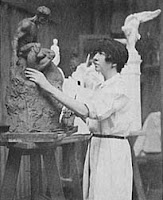Hastings, by Griff Hosker
Review by Nancy Bilyeau
Like many other people, I have always perceived
William the Conqueror and his Norman army as a menacing and relentless invading
force that squashed the Saxons through overwhelming brute force rather than following
up on a legal right to succession.
Griff Hosker’s novel Hastings at first glance, may
look like an interesting take on the traditional view of 1066. It is subtitled “Conquest:
Book 1” with the cover message “The Battle That Changed Everything.” This is a
book coming to 1066 from a Norman perspective.
I knew that with Hosker, I would get a deeply researched and
authentic medieval-age story. He has written historical novels spanning the
Roman era to World War II, with my favorite series being the Lord Edward’s
Archer books set in 13th-century Wales and England.
What I wasn’t ready for in Hastings were the emotional
stakes of the story, which soon captured me. The protagonist, Richard fitz
Malet, is a man with a complicated family background living in a complicated time of constantly shifting alliances. His father was a Norman
knight, Lord Robert Malet, but his mother was English. She was the young daughter
of an English housecarl, a bodyguard who served Lord Robert when he came to
England. Seduced and swiftly discarded, she gave birth to an illegitimate son
that the Norman family reluctantly raises, but at a distance.

There are enormous tensions springing from the circumstances
of Richard’s birth. His grandfather resents the seduction of his daughter,
which ruined her for marriage and broke her health, leading to an early death.
Richard learns conversational English from his grandfather, the only loving
family he has, which will prove crucial in later chapters. As his grandfather is
responsible for teaching warrior skills and weaponry handling to the boys of
the large household, he pays special attention to the training of his grandson.
As he tells Richard, the Normans see the English as inferior and Richard is
intended to live as a bodyguard of his half-brothers, inherently disposable. He
needs the finest warrior skills obtainable in order to stay alive.
“Thanks to my grandfather, I never felt myself a Norman,”
Richard tells the reader. But throughout his childhood and young manhood, he absorbs
Norman standards of manhood and strengths in warfare. He respects those strengths,
which made the Normans a feared group throughout Europe. However, his emotional
loyalty is to his grandfather and the friends he makes himself, and later to
warriors who go out of their way to look out for him, as opposed to seeing him
as nothing but a human shield.
There is a great deal of tense and absorbing drama in
Richard’s changing position as he slowly transforms from ignored bastard son
of an obscure English girl to a formidable warrior. The Malet family is not wholly
proud of those skills, especially his nasty half-brother Durand. Because Richard
is not one of the “important” legitimate brothers, and these knights, squires,
and housecarls often plunge into deadly conflicts, it’s by no means a certainty
to the reader that Richard will escape from any encounter unscathed.
In these encounters, Hosker’s ability to describe battles--both
the “big picture” and the reality of up-close fighting between men grimly trying
to kill each other—really shines. He knows every detail of the weapons and
armory. Those curious about William the Conqueror will find fascinating
descriptions of his court and his trips to England with Richard in his retinue.
These trips were diplomatic for the most part, and I was surprised by how close
he was to the childless King Edward. Duke William’s claim to succeed to the
English throne is outlined well.
Richard fitz Malet is more than a proficient warrior and a feared athletic combatant in a time of fierce war. He is someone of deep loyalty.
While he has a good heart, there is a simmering bitterness inside Richard. I am
eager to see where the next novels in Hosker’s series take this engaging
protagonist.
To learn more about Hosker, go here: https://www.griffhosker.com/
Hastings on amazon: https://www.amazon.com/Hastings-Conquest-Book-Griff-Hosker-ebook/dp/B0C1NMYX78/






